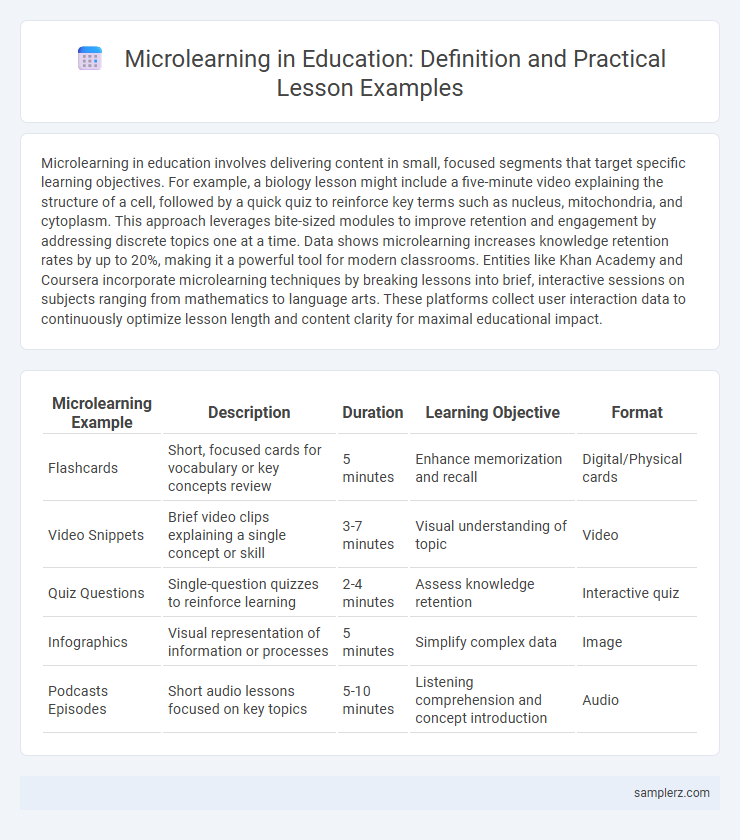Microlearning in education involves delivering content in small, focused segments that target specific learning objectives. For example, a biology lesson might include a five-minute video explaining the structure of a cell, followed by a quick quiz to reinforce key terms such as nucleus, mitochondria, and cytoplasm. This approach leverages bite-sized modules to improve retention and engagement by addressing discrete topics one at a time. Data shows microlearning increases knowledge retention rates by up to 20%, making it a powerful tool for modern classrooms. Entities like Khan Academy and Coursera incorporate microlearning techniques by breaking lessons into brief, interactive sessions on subjects ranging from mathematics to language arts. These platforms collect user interaction data to continuously optimize lesson length and content clarity for maximal educational impact.
Table of Comparison
| Microlearning Example | Description | Duration | Learning Objective | Format |
|---|---|---|---|---|
| Flashcards | Short, focused cards for vocabulary or key concepts review | 5 minutes | Enhance memorization and recall | Digital/Physical cards |
| Video Snippets | Brief video clips explaining a single concept or skill | 3-7 minutes | Visual understanding of topic | Video |
| Quiz Questions | Single-question quizzes to reinforce learning | 2-4 minutes | Assess knowledge retention | Interactive quiz |
| Infographics | Visual representation of information or processes | 5 minutes | Simplify complex data | Image |
| Podcasts Episodes | Short audio lessons focused on key topics | 5-10 minutes | Listening comprehension and concept introduction | Audio |
Microlearning Defined: A New Approach in Education
Microlearning involves delivering educational content in small, focused segments, such as 5-minute video lessons or interactive quizzes, to enhance retention and engagement. This approach allows students to grasp complex concepts through concise examples like bite-sized vocabulary drills or step-by-step problem-solving exercises. By integrating microlearning strategies into traditional curricula, educators can boost knowledge acquisition and support flexible, personalized learning experiences.
Key Features of Microlearning in Classroom Settings
Microlearning in classroom settings involves delivering concise, focused lessons that target specific learning objectives, such as using short videos or interactive quizzes lasting 3 to 5 minutes. Key features include high engagement through multimedia content, immediate feedback, and adaptability to diverse learning paces, which enhance knowledge retention and motivation. This approach leverages spaced repetition and chunking methods to optimize cognitive load and promote long-term mastery of complex subjects.
Real-World Examples of Microlearning in Lessons
Real-world examples of microlearning in lessons include short video tutorials that explain complex scientific concepts in under five minutes, interactive quizzes embedded within digital textbooks to reinforce key points, and bite-sized case studies that allow students to apply theoretical knowledge in practical scenarios. These microlearning strategies enhance retention by breaking down content into manageable chunks aligned with students' attention spans. Incorporating real-life applications in microlearning boosts engagement and facilitates deeper understanding of subjects.
Using Short Videos for Concept Introduction
Using short videos for concept introduction in education enhances student engagement by presenting information in concise, visually appealing formats that cater to diverse learning styles. These videos, typically 2 to 5 minutes long, effectively break down complex topics into manageable segments, aiding retention and comprehension. Platforms like Khan Academy and TED-Ed exemplify successful integration of microlearning through brief, focused video content tailored to various educational levels.
Interactive Quizzes as Microlearning Tools
Interactive quizzes serve as effective microlearning tools by breaking down complex subjects into brief, targeted questions that enhance retention and engagement. These quizzes provide instant feedback, enabling learners to identify knowledge gaps and reinforce key concepts in real-time. Incorporating interactive quizzes into lessons boosts active learning and supports personalized education pathways.
Flashcard Activities to Reinforce Knowledge
Flashcard activities enhance memory retention by promoting active recall and spaced repetition in microlearning environments. Learners engage with concise, targeted questions and answers that facilitate quick review of key concepts. This method optimizes cognitive load, making knowledge reinforcement efficient and effective within brief lesson segments.
Microlearning Modules for Skill Development
Microlearning modules for skill development include short, focused lessons such as 5-minute video tutorials on coding syntax or interactive quizzes targeting specific language grammar rules. These modules enable learners to acquire practical skills efficiently by breaking complex topics into manageable segments. Real-world scenarios and instant feedback within these micro-units enhance retention and application of new competencies.
Mobile-Based Microlearning Assignments
Mobile-based microlearning assignments provide bite-sized educational content delivered through smartphones, enabling students to engage with lessons anytime and anywhere. These assignments often include interactive quizzes, flashcards, and video snippets that reinforce key concepts in short sessions, enhancing retention and motivation. Leveraging mobile technology, educators can track progress and tailor content to individual learning paces, optimizing personalized education outcomes.
Gamified Microlearning Experiences in Education
Gamified microlearning experiences in education enhance student engagement by integrating game elements such as points, badges, and leaderboards into short, focused lessons. These bite-sized modules leverage interactive quizzes and challenges to reinforce key concepts through immediate feedback and reward systems. Research shows that gamified microlearning improves knowledge retention and motivation by making complex subjects more accessible and enjoyable for learners.
Best Practices for Integrating Microlearning in Lessons
Incorporate microlearning in lessons by breaking complex topics into short, focused modules lasting 3 to 5 minutes, facilitating better retention and engagement. Utilize multimedia elements such as videos, quizzes, and infographics to cater to various learning styles and reinforce key concepts effectively. Ensure frequent opportunities for learners to apply knowledge through interactive exercises that promote active learning and immediate feedback.

example of microlearning in lesson Infographic
 samplerz.com
samplerz.com